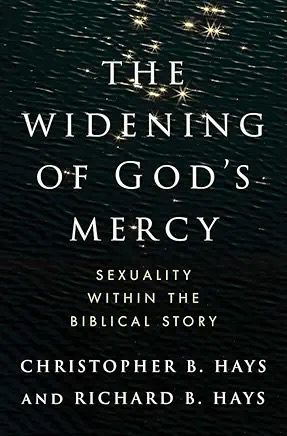C.B. Hays and R.B Hays, The Widening of God’s Mercy (Yale U. Press, 2024) 272 pages
PART ONE: Preliminary Thoughts
In the beginning of The Widening of God’s Mercy we are given personal stories from both Chris and his father Richard Hays as to why there has been a change in mind about what we should think about the Scriptures’ prohibitions of same sexual activity (in both the OT and NT), as well as related matters, such as gay marriage, the ordination of LGBTQ+ persons and the like. The trajectory of their argument is to reach a conclusion that LGBTQ+ persons should be given full inclusion in the Christian church without asking them to change their sexual behavior, indeed without excluding them in any way from being clergy, being married in a Christian ceremony and so on. And what led to this conclusion is participation in church communities where there is ‘full inclusion’ of those folks. In short, personal experience has led to a re-evaluation of how to deal with the Biblical data. And don’t expect to find any treatment of the key texts in the OT and NT which prohibit same sex sexual activity. They deliberately are omitting any such discussion, presumably because as they say—the traditionalists are right about what those imperatives actually say. Richard is explicit in saying he hasn’t changed his mind about what those texts say and mean.
Chris also shares his frustrations with his perceived inconsistent policies of Fuller Seminary as to what faith stand is required of members of the faculty when it comes to ‘the presenting issue’ that this book seeks to address. Part of the argument, as we shall see, is that the Bible is full of ‘contradictions’ or, put another way, full of evidence that God changes his mind from time to time on major issues partly in response to human requests or protests. We will deal with the ‘changes his mind’ idea in the next part of this review.
In regard to full disclosure as to where I am coming from on this large issue, the two studies I published are 1) Biblical Theology, Cambridge University Press (2019) that won the Association of American Publishers (AAP) PROSE Award along with Tom Wright’s History and Eschatology, as the book of the year in theology and philosophy and 2) Sola Scriptura, Scripture’s Final Authority in the Modern World, Baylor Press (2023). The latter concludes that what the phrase meant for the Catholics who first used it (William of Ockham or Marsilius of Padua, or John Wycliffe) and then the Protestants is that God’s Word, the Holy Scriptures, are the final authority in matters of faith and practice, not a human being, not even the Pope. This, in turn, means that human experience, reason, or tradition, if they have some kind of authority, clearly have lesser authority when discerning what is true about God and His will for humankind.
A major problem with The Widening of God’s Mercy is that it does not understand the nature of progressive revelation which is not the same thing as saying God changed his mind, not least because progressive revelation means we gradually learn about God’s will and the believer’s ability to understand that will. Nor does the book recognize the Scriptures as the final authority for faith and practice unless, of course, using one’s own judgment, one gets to pick and choose which Scriptures. This, in turn, sadly makes the interpreter, not God, and not the Scriptures, the final arbiter of the truth in these matters. And this is no small matter!












 English (US) ·
English (US) ·